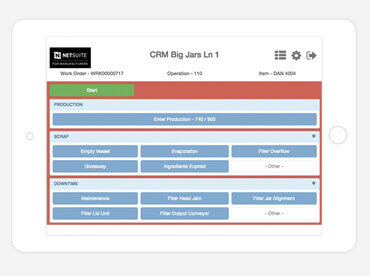Product Features
For Manufacturing
Home / Shop Floor Control
Menu
Shop Floor Control
Get real-time updates from the shop floor via NetSuite’s interactive tablet application and traditional barcoding
Many manufacturers spend significant time and effort trying to predict the future with planning and scheduling applications. Yet, recording what, where, when, why and how your products are currently being manufactured is just as critical and is a key element to a more accurate schedule. NetSuite’s Shop Floor Control and Mobility solutions make it easy to quickly and accurately gather information from the manufacturing process.
Key Benefits
- Powerful, easy-to-use functionality increases user satisfaction and data accuracy.
- Real-time updates from manufacturing enable you to make educated decisions that affect your business operations.
- User configurable tablet application allows users to optimize the system on the fly.
- Native application designed from the ground up as part of Advanced Manufacturing.
- Issue materials, enter production, record downtime and identify quality issues as they happen.






























